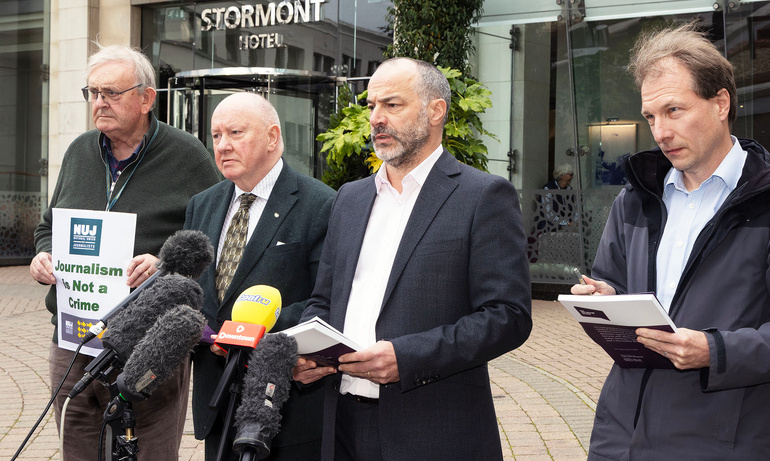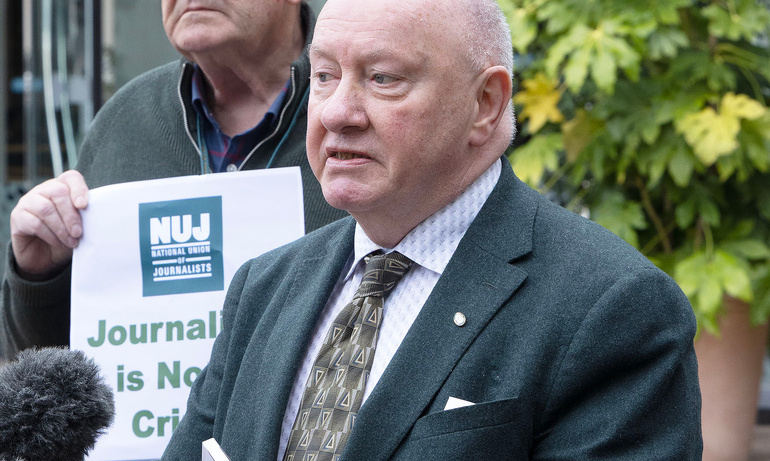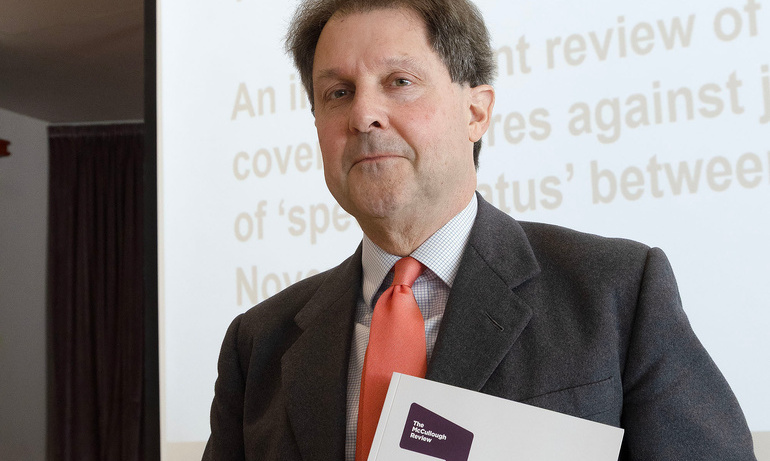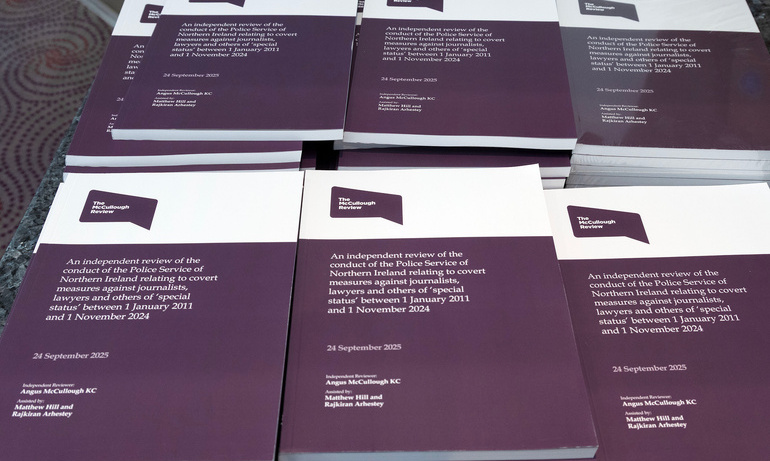McCullough Review highlights need for government to blow the whistle on illegal surveillance
The National Union of Journalists has called on Hilary Benn, Secretary of State, to bring forward legislation aimed at ensuring strict compliance with the laws governing surveillance by police forces operating in Northern Ireland.
The demand comes as John Boucher, Police Service of Northern Ireland (PSNI) chief constable accepted the 200-page report into covert measures against journalists, lawyers and other individuals of special interest prepared by Angus McCullough KC. The report makes a series of strong recommendations on the foot of revelations at the Investigatory Powers Tribunal regarding the unlawful PSNI surveillance of NUJ members Barry McCaffrey and Trevor Birney.
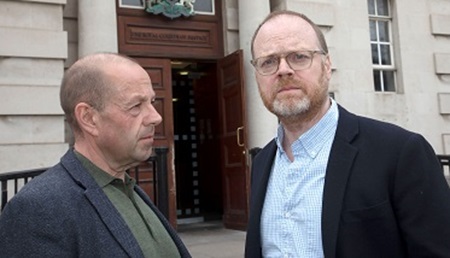
Barry McCaffrey and Trevor Birney.
© Kevin Cooper
Welcoming the report Séamus Dooley, NUJ assistant general secretary, said the NUJ views the Review as "a valuable starting point with key recommendations which, if adopted, would help ensure strict adherence to best practice by the PSNI. "
He added:
"The NUJ welcomed the establishment of the McCullough Review. I was pleased to accept the invitation of the Chief Constable to represent the NUJ on the Group of Experts and Stakeholders (GoES), established to advise Mr Angus McCullough KC.
"On behalf of the NUJ, I welcome the report and recommendations. While the GoES did not have a direct role in the investigation or recommendations, membership of the group provided a valuable insight into the work of Mr McCullough and his team and certainly provided grounds for confidence in the process.
"The engagement and cooperation of the chief constable marks a welcome change in the attitude of the leadership of the PSNI. The Terms of Reference of the McCullough Review are, by definition, restricted to the PSNI and limited in scope to the period 1 January 2011 to 1 November 2024, a period of just under 14 years.
"The NUJ has been consistent in demanding a broader review to deal with issues beyond the scope of the McCullough Review, which was confined to the activities of the PSNI."
Dooley re-echoed the union's call for an independent investigation into police surveillance in Northern Ireland, separate from PSNI surveillance covered by the McCullough Review.
In a letter to Hilary Benn he also supported the joint call by Amnesty International and the Committee on the Administration of Justice for the appointment of a Commission for Covert Law Enforcement in Northern Ireland, in line with the long ignored recommendation of the Patten Commission.
In his letter, Dooley also highlighted the unsatisfactory nature of the secretive, costly and complex IPT process which he said, had led to the denial of justice because of the barriers faced by so many potential complainants.
He also told Mr Benn that he had "a historic opportunity to help rebuild trust and confidence in policing in Northern Ireland."
He said:
"Public confidence in policing in Northern Ireland was gravely damaged by the revelations at the Investigatory Powers Tribunal (IPT) and this was compounded by the manner in which the PSNI and other parties engaged with the IPT process, including the withholding by the PSNI of vital information, for which the organisation has apologised this week to the Tribunal.
The IPT process is secretive in nature, lacks transparency, is protracted and, as a consequence, extremely costly for media organisations and journalists, especially freelance journalists and smaller, independent companies.
The financial implications of IPT hearings have served as a deterrent to some of those who believe they have been subject to unlawful surveillance. Those with potential IPT cases, based on unfair procedures and a failure to adhere to due process, should not be denied access to justice on the basis of cost.
We have witnessed the toll which participation in the IPT process has had on the wellbeing of our members.
In this regard the NUJ believes that the UK government must act to address the outstanding issues which flow from the Birney/McCaffrey case and the ongoing case of Vincent Kearney and the BBC.
We support the call by Amnesty International and the Committee on the Administration of Justice for the establishment of a public inquiry into unlawful use in Northern Ireland of covert surveillance powers against journalists, lawyers and others of ‘special status’ by the Security Service MI5 and police forces, other than the PSNI.
It is gravely concerning that the costs and complex IPT process and the subsequent McCullough Review were needed to identify unlawful surveillance of the PSNI.
It is worth noting that the pattern of behaviour was routinely missed during inspections by the oversight body – the Investigatory Powers Commissioner Office (ICPO).
The Independent Commission on Policing in Northern Ireland established in 1998 and chaired by Chris Patten (the Patten Commission) recommended a specific Commissioner for Covert Law Enforcement in Northern Ireland with a range of powers of intervention to ensure covert policing techniques would be used within the law.
Patten recommended a NI-specific Commissioner – not just for the PSNI, but to cover MI5 and any other agencies operating in law enforcement, who would be: “...a senior judicial figure, based in Northern Ireland, whose remit should include surveillance, use of informants and undercover operations... [with] powers to inspect the police (and other agencies acting in support of the police) and to require documents or information to be produced, either in response to representations received, directly or through the Police Ombudsman, the Policing Board or others, or on his or her own initiative. The commissioner should ... conduct sufficient inquiries to ascertain whether covert policing techniques are being used: with due regard for the law; only when there is a justification for them; and when conventional policing techniques could not reasonably be expected to achieve the objective. The commissioner should check that justifications for continuing specific covert operations are regularly reviewed, and that records of operations are maintained accurately and securely, with adequate safeguards against unauthorised disclosure.” (Patten Report, paragraph 6.44).
Further to the Belfast/Good Friday Agreement two relevant bodies were established, the Policing Board and the Office of the Police Ombudsman. The Commissioner for Covert Law Enforcement in Northern Ireland remains the outstanding unimplemented oversight institution recommended by Patten.
The introduction of legislation governing the establishment of a Commissioner for Covert Law Enforcement in Northern Ireland as a matter of urgency we believe could address many of the fundamental issues arising from the IPT and the McCullough Review. Indeed, the existence of such a commissioner may have averted the need for the Review and the action which led to its establishment.
The scale of that task should not be underestimated but the establishment of a public inquiry and a commitment to legislation covering the establishment of a Commissioner for Covert Law Enforcement in Northern Ireland would be a major step forward."
The NUJ has welcomed the unambiguous commitment by John Boucher, chief constable, made at today's launch.
Dooley said:
"The report deserves detailed consideration. The chief constable has accepted the report and the recommendation and this is a very important development.
"That commitment must be met by a culture change throughout the PSNI."
You can read Mr Boucher's statement here: Chief Constable's statement following the publication of the McCullough Review | PSNI
“It’s now over to Hilary Benn and it’s now over to the British government to use their powers to appoint an independent body to investigate the shadowy forces who are not dealt with through the terms of reference of this report.” said Dooley. Watch the NUJ's assistant general secretary and Patrick Corrigan from Amnesty International following today’s conference.
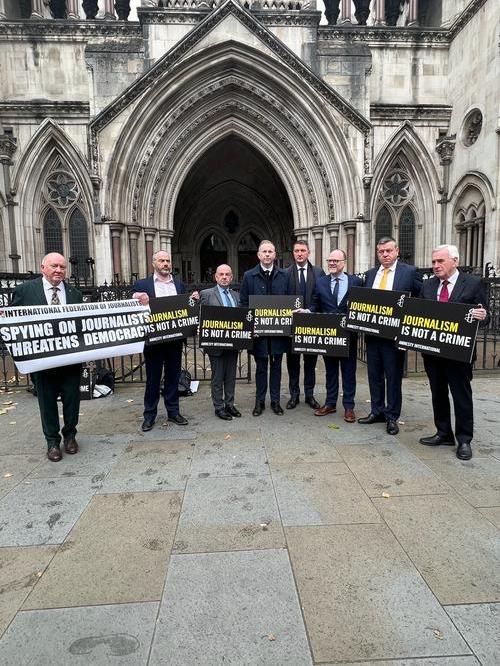
Advisory Note:
The Independent Commission on Policing in Northern Ireland, better known as the Patten Commission, was set up in June 1998 to carry out a fundamental review of the RUC and recommend proposals for a new policing service.
It was chaired by Chris Patten, former minister and the last governor of Hong Kong.
The aim of Patten was "to depoliticise policing".
The Commission set itself five key objectives:
- Does this proposal promote effective and efficient policing?
- Will it deliver fair and impartial policing, free from partisan control?
- Does it provide for accountability, both to the law and to the community?
- Will it make the police more representative of the society they serve?
- Does it protect and vindicate the human rights and human dignity of all?
Links
Police in Northern Ireland used journalists' phone data to detect staff leaks - BBC News

